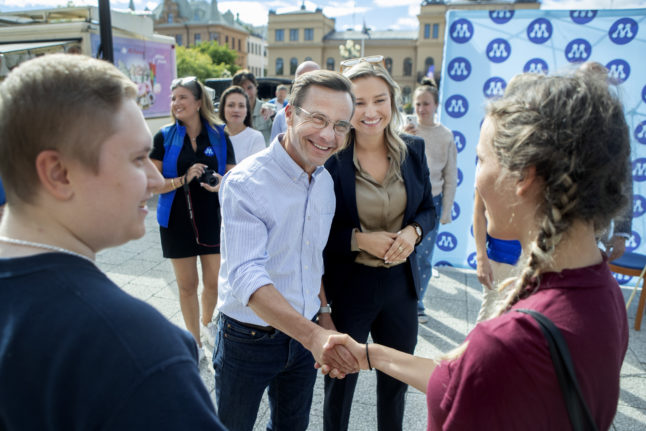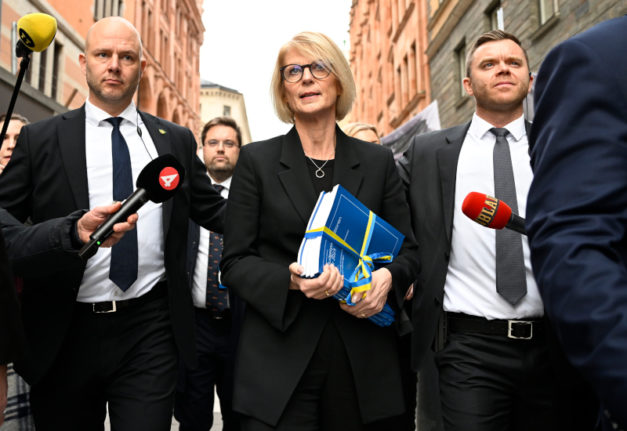The anti-immigration and nationalist Sweden Democrats have long been treated as pariahs on the Scandinavian country’s political scene. But opinion polls suggest they will surge to become the second-biggest party in parliament — and one whose backing is essential if the right wants to form a government.
Sweden, currently in the delicate process of joining Nato, has since 2014 been governed by the Social Democrats which have dominated Swedish politics since the 1930s. Prime Minister Magdalena Andersson, who took over the post just nine months ago, enjoys strong support among voters.
Some 55 percent want her to remain in her post, compared to 32 percent for her challenger from the conservative Moderates, Ulf Kristersson.
The election campaign has however been dominated by issues close to right-wing voters: cracking down on crime and gang violence, integration of immigrants and soaring energy bills. Despite the broad support for Andersson the outcome of the election remains wide open.
Polls credit the left with 48.6 to 52.6 percent of voter support, compared to 47.1 to 49.6 percent for the right.
The Social Democrats can rely on support from the Greens, Left and Centre parties, while the Moderates, Christian Democrats, Liberals and Sweden Democrats make up the right-wing bloc. Both blocs are however beset by internal divisions that will make the process of forming a government tricky.
In the 2018 election — when both sides refused to engage with the Sweden Democrats — it took the Social Democrats four months to form a minority government.
‘Tectonic shift’
Now that the far-right has been welcomed into the right-wing fold, “one of the two constellations will win a majority”, Stockholm University political science professor Jan Teorell told AFP. “It’s impossible to guess which one based on the polls, but one of them will win a majority.”
The end of the Sweden Democrats’ political isolation, and the prospect of it becoming the biggest right-wing party, is “an enormous shift in Swedish society”, said Anders Lindberg, a leader writer at left-wing tabloid Aftonbladet.
Born out of a neo-Nazi movement at the end of the 1980s, the Sweden Democrats entered parliament in 2010 with 5.7 percent of votes. The party’s anti-immigration stance, together with its defence of Swedes’ cherished welfare state, has appealed to the working class and pensioners.
Its rise has come alongside a large influx of immigrants, with the country of 10 million taking in almost half a million asylum seekers in a decade.
“That is reflected in the issues” in the campaign, Lindberg said. “Crime and immigration are front and centre, whereas if you go back in history Swedish elections were always about welfare, the economy, jobs. This is a tectonic shift,” he said.
‘Somalitowns’
Andersson, Sweden’s first woman prime minister, took over in November 2021 when her predecessor Stefan Löfven retired from politics. Since then, the former finance minister has earned voters’ respect for steering the country with a steady hand.
While Nato membership was long unthinkable for her Social Democrats, she persuaded the party that Russia’s invasion of Ukraine required a hasty
membership application. Sweden had until then been militarily non-aligned for two centuries.
“A lot of people have confidence in her as prime minister, even among those who don’t vote for the Social Democrats,” Teorell noted.
Six years after her party tightened its generous stance on immigration, Andersson acknowledged it had “failed” to integrate immigrants in many
disadvantaged neighbourhoods. She caused a stir recently when she said Sweden should not have “Somalitowns”.
Polls credit the Social Democrats with 28.5 to 30 percent of voter support, compared to their record low of 28.3 percent in the 2018 election. The Sweden Democrats are seen garnering 18.8 to 19.8 percent and the Moderates 17.6 to 18.1 percent.
While Kristersson remains Andersson’s challenger for the post of prime minister, having the far right overtake the Moderates as the second-biggest party in parliament would be disastrous for him.
He would have to concede more ground to the far right, which could demand cabinet positions rather than just providing informal backing in parliament.
“We want to have a maximum of influence, so it’s clear that our point of departure is to be in the government”, the Sweden Democrats’ leader Jimmie Åkesson told AFP. “Otherwise it’s going to be costly for the government to have us on board.”



 Please whitelist us to continue reading.
Please whitelist us to continue reading.
Member comments